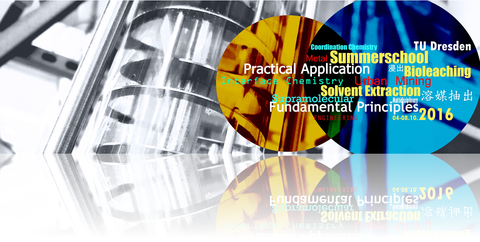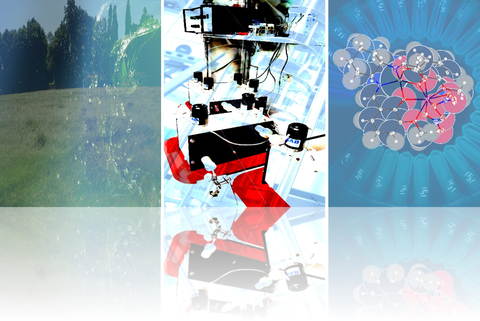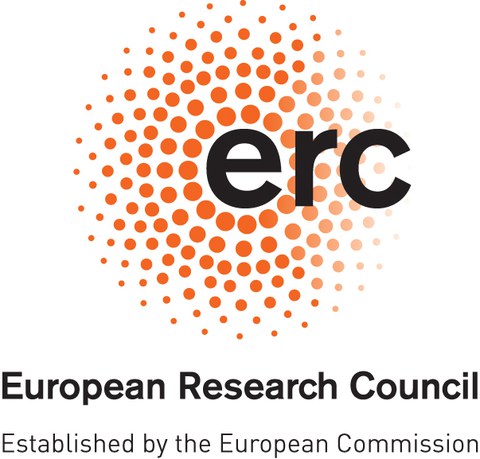Bio-Leaching and Metal Extraction Processes for Urban Mining: From Fundamental Principles to Practical Applications
International Summer School 2016
4th - 8th October 2016
The creation of a sustainable and zero waste industry of the future requires an efficient recycling management and the utilization of Urban Mining. The key to achieve this ambitious goal will be the availability of new selective leaching processes, including bio-leaching and highly effective separation processes. Thus, the recovery of high-tech metals such as rare earths, precious metals, lithium, gallium or indium and other strategic elements such as phosphorus are in focus of current research. Today, the recycling rate of resources is too low. The selective binding and separation of single species still constitutes major challenges in current chemical research but have significantly improved over the last years. Within the Summer School, national and international renowned researchers will introduce interested students on the master, PhD and postdoc-level to modern separation processes including certain aspects of bio-leaching. The School focuses on the three aspects:
- receptor design based on a wide-ranging integration of synthetic, advanced molecular and supramolecular chemistry
- fundamental chemical knowledge of solvent extraction and process design for industrial applications
- new developments in the bio-leaching
Special attention will be given to the general theory of leaching (including bio-leaching) and extraction processes. In addition, novel aspects for the interpretation of the extraction behaviour including coordination and supramolecular chemistry principles will be addressed.
The International Summer School is organised by Prof. Jan J. Weigand (Department of Chemistry and Food Chemistry, Chair of Inorganic Molecular Chemistry) and Prof. Marion Ansorge-Schumacher (Department of Biology, Chair of Molecular Biotechnology). The school aims at PhD students and postdocs in all covered fields and takes place from October 4th to October 8th 2016 at the at the Art’otel Dresden in Germany.
Please apply via mail () before August 25th 2016.
The registration fee of 400 EUR will cover conference material, access to all scientific sessions, coffee breaks, lunches and social events. Furthermore the accommodation (October 3rd to October 08th 2016; 5 nights) in the International Student Guest House is included.
Application for travel grants and waving of registration is possible. Eligible applicants will be notified shortly after registration closing.
Please provide the following details with your application:
-
Name
-
Given Name
-
Date of birth
-
Address
-
Institution
-
Occupation
-
Bank details (in case financial support for travel expenses is granted).
Speakers:
-
Prof.in Marion Ansorge-Schumacher (TUD / Germany)
-
Prof. Hans-Jörg Bart (TU Kaiserslautern / Germany)
-
Prof. Karsten Gloe (TUD / Germany)
-
Dr. Jörg Koch (Sulzer Chemtech AG, Allschwil / Switzerland)
-
Prof. Leonard F. Lindoy (University of Sydney / Australia)
-
Dr. Hans Reinhardt (MEAB Gothenburg / Sweden)
-
Prof. Markus Reuter (HZDR / Germany)
-
Prof.in Christiane Scharf (HZDR Freiberg / Germany)
-
Prof. K.-Peter Stahmann (B-TU/Germany)
-
Prof. Peter Tasker (University of Edinburgh / UK)
-
Prof. Jan J. Weigand (TUD / Germany)
-
Dr. Marco Wenzel (TUD / Germany)
|
Location: Art’otel Dresden, Ostra-Allee 33, 01067 Dresden, Germany Monday, 03.10.2016 |
||
| 15:00 | Registration and welcoming of the participants | |
|
|
||
| Time | Topic | Speaker |
| 9:00 |
Introduction and opening of the school |
Jan J. Weigand TU Dresden, D |
| 9:15 | Solvent extraction: Introduction to basics and practice |
Karsten Gloe, TU Dresden, D |
| 10:45 | Coffee break and snacks | - |
| 11:15 |
Bioleaching bacteria - two sides of the coin |
Klaus-Peter Stahmann, BTU Cottbus, D |
| 12:45 | Lunch Break | - |
| 14:00 |
Solvent extraction: The coordination chemistry behind extractive metallurgy, part I base metals |
Peter A. Tasker, University of Edinburgh, UK |
| 15:30 |
Solvent extraction and critical metals |
Hans-Jörg Bart, TU Kaiserslautern, D |
| 17:00 | Coffee break | - |
| 18:30 |
Metallurgy - a key to the circular economy |
Markus Reuter, Helmholtz Institute Freiberg of Resource Technology, D |
| 20:00 | Welcome reception | |
|
|
||
| Time | Topic | Speaker |
| 9:00 | Recycling of strategic elements by extractive metallurgy | Christiane Scharf, Helmholtz Institute Freiberg of Resource Technology, D |
| 10:00 | Extraction apparatus and hydrodynamics |
Hans-Jörg Bart, |
| 11:00 |
Coffee break and snacks |
- |
| 11:30 | Selected industrial applications in solvent extraction | Jörg Koch, Sulzer Chemtech, Allschwil, CH |
| 12:30 | Lunch break | - |
| 14:00 | Industrial scale extraction equipment | Jörg Koch, Sulzer Chemtech, Allschwil, CH |
| 15:30 | Coffee break | - |
| 17:30 | Night of Excellence |
Magic chemistry: From spectacular experiments to applications |
Jan J. Weigand, |
|
|
||
| Time | Topic | Speaker |
| 9:00 | Solvent extraction in the treatment of metal containing waste I | Hans Reinhardt, MEAB Askim, S |
| 9:50 | Solvent extraction in the treatment of metal containing waste II | Hans Reinhardt, MEAB Askim, S |
| 10:35 |
Coffee break and snacks |
- |
| 11:00 | Seminar on practical tasks | Jörg Koch, Sulzer Chemtech Allschwil, CH |
| 12:00 |
Metal recycling within the urban mining |
Jan J. Weigand, |
| 13:00 | Lunch break | - |
| 14:30 | A walk through the historical Dresden | - |
|
|
||
| Time | Topic | Speaker |
| 9:00 | Extraction of anions: Principles and possibilities | Marco Wenzel, TU Dresden, D |
| 10:00 |
Solvent extraction: The coordination chemistry behind extractive metallurgy, part II platinum group metals |
Peter A. Tasker, University of Edinburgh, UK |
| 11:00 |
Coffee break and snacks |
- |
| 14:00 |
Supramolecular concepts as background for solvent extraction design |
Leonard F. Lindoy, |
| 15:00 | Strategies for employing supramolecular chemistry in solvent extraction | Karsten Gloe, TU Dresden, D |
| 16:00 | Coffee break | |
|
|
||
| Time | Topic | Speaker |
| 9:00 | Solvent extraction: Current trends and future perspectives | Round table discussion |
| 11:00 | Closing of the school | |
This event is funded by the Excellence Initiative of the German Federal and State Governments and the ERC



